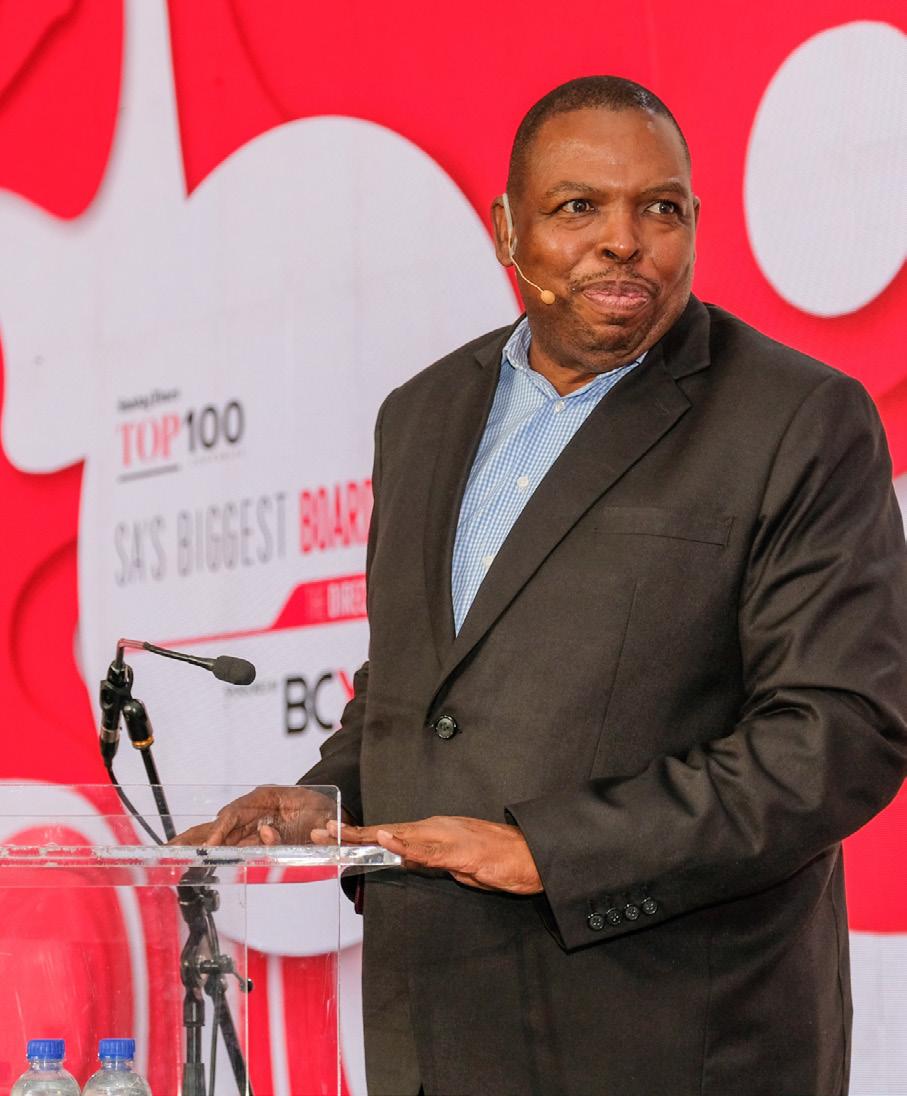SUSTAINABLE BUSINESSES SHAPING THE FUTURE OF SOUTH AFRICA








We’ve spearheaded digital innovation excellence since 2019 with our Digital Innovation Awards South African SMEs, corporates or public sector organisations have a uni ue oppor tunit y to showcase innovation that’s making a difference in the South African landscape and stand a chance to win the coveted title of 2023 BCX Digital Innovator of the Year Real grow th oppor tunities are unlocked while innovation is celebrated.
Enter online at www.bcx.co.za or follow #BCXDIA
Entries close 15 September 2023 All entries are free
The mandate for businesses to operate responsibly is nothing new. What is new is a sustainability focus which is linked to realising tangible environmental, social and governance (ESG) goals. The 2023 Sunday Times Directors Event, sponsored by BCX for the fifth consecutive year, unpacked how South African businesses are really preforming when it comes to sustainability and where we go from here.
An annual event, dubbed SA’s biggest board meeting, The Directors Event puts the spotlight on burning issues facing the business sector and suggests possible solutions to the country’s most pressing problems.

Welcoming delegates to the ninth edition of The Directors Event, Sunday Times editor S’thembisizo Msomi said that in a country gripped by energy and infrastructure issues and a governing party pervaded by corruption, it is up to the private sector to navigate the political potholes and work to keep the lights on.
In his opening remarks, Jonas Bogoshi, CEO of BCX said that while most companies had adopted and implemented an ESG framework, there remain vocal critics of ESG who argue that, amongst others, ESG is nothing more than a woke movement out of control, that ESG measurement encourages greenwashing and that a focus on ESG has a tendency to distort markets and results in a misallocation of capital. Critics of ESG also point to the fact that ESG does not take into account the development status of districts, regions and countries and has a disproportionately negative impact on emerging economics.
Conceding that none of these criticisms are entirely incorrect, Bogoshi pointed out that the key focus of business is to meet customer requirements, generate profits and create value for shareholders. However, in emerging economies in particular, businesses have the added responsibility of lifting people out of poverty. Sustainability and ESG, he said, are not an either/or decision but is about ethical imperatives and ensuring a long-term future for the business, communities and stakeholders.
The actions that we take today will create either positive or negative results for future generations. Ultimately, we need to decide what kind of legacy we want to leave,”.

The keynote address was delivered by Dr Pali Lehohla, the former statistician-general of SA and currently a director at Economic Modelling Academy, an organisation that teaches high-level skills in economic modelling.
Lehohla discussed a number of issues including the skills gap, the high rate of unemployment, the role of small and mediumsized businesses to address the unemployment crisis, why young people hold the key to unlocking SA’s potential and the importance of adopting sustainable and responsible business models.
SA’s problems, he said, can be tracked back to a number of macroeconomic issues which in turn rely on statistics and data. The country’s long-term performance when it comes to educational outcomes suggests that high unemployment, particularly amongst the youth, is an irreversible trend. Data also suggests that closing the skills gap will not be possible. Both metrics have been worsening in recent years. Poor educational outcomes add
to high youth unemployment. By all indications SA is a failing state, he said. In the belly of the looting state machinery reside the poor who eke out an honest living, expecting ironically, that they are protected. But sadly, their supposed protector is accused number one.
The government’s policies - which typically follow a macroeconomic populism - are not sustainable, he argued, adding that government does not act decisively and appears increasingly incapacitated.
Explaining why econometric modelling matters, Lehohla said that since the dawn of democracy, SA has applied a range of evolutionary approaches, all of which have had major material defects. Government, however, does not have the tools to predict the country’s future.
Inclusive development requires a capability approach. Key to resolving high inequality in SA is increasing GDP growth levels
To grow GDP requires micro reforms, trade and industry reforms, macro reforms and social policy reforms – which, he said, combined could grow GDP above 5%. Lehohla urged SA to deploy econometric modelling and to implement the proposals made by businesses to reignite growth and future-proof the economy and get SA out of its current rut.


If we don’t implement the right tools SA will continue to be fighting fires, he said, concluding his address by saying that there is currently an absence of intellect in how we do business in SA because we are not using foresight sufficiently.
The first panel discussion, moderated by Gugulethu Mfuphi, focused on social impact and what it means for business. Business is frequently criticised for not focusing sufficiently on the social aspect of ESG.

South Africans may be feeling isolated, but there remains strength in social impact. As businesses we need to make this connection if we are going to take sustainable next steps. We need to effect change, close the skills gaps, crack down on unacceptably high unemployment by opening the doors to the youth and collaborate and trade more with small and medium-sized businesses. Critically, we need to grow a skills base within the youth segment because we can’t afford to leave the youth behind if we want to be sustainable. Ultimately, it’s about managing our country as a sustainable business of great potential.
Professor Lauren Graham, associate professor and director at the Centre for Social Development in Africa at the University of Johannesburg, pointed out that at a micro level there are pockets of excellence at all levels of society. We need to highlight those pockets of excellence, she said.
Government has many leverage points which it is not making sufficient use of. Small and medium-sized businesses often don’t have human resources departments and are not aware of government initiatives they can take advantage of. We could, for example, take better advantage of the skills development levy, she suggested. Critically, we need to make it easier for the youth to access skills development initiatives.
Importantly, most private sector businesses genuinely want to make a difference, said Graham, adding that it is important to grow awareness of available policy mechanisms. “We need to scale wide and scale up and help to shift policies.”
Brent Lindeque, editor and chief of Good Things Guy, agreed that businesses do care and want to make a positive difference. “Doing good is good for business,” he said, adding that when we assist other South Africans to rise, we all rise together.
He commended NGOs for the being the backbone of SA, revealing that they are doing a huge amount of good work for disadvantaged communities.
has been very purposeful about its sustainability journey. Telkom has made significant investments in thousands of SMMEs through the Telkom Future Makers Programme, partnering with skills development organisations and providing funding.
Nazrana Sultan is head of strategy and business planning at Digital Frontiers, an online education business which offers programmes that support the acceleration of global initiatives in digital finance services and financial inclusion, gender equality and inclusive digital economies.
“We believe that 20% of the world’s future jobs will be dedicated to solving the world’s biggest problems which is why we have a mission to co-create future skills and redefine capabilities while connecting ecosystems that establish opportunities for work for good,” said Sultan, adding that the company aims to create both an impact positive and build skills capacity.
All too often the terms CSI, ESG and sustainability are used interchangeably, he pointed out, adding that it is often difficult to measure the impact of sustainability initiatives.
Arguing that education is key to creating a better SA, he referenced The Unlimited’s early childhood development centres which have helped more than 1m children in the last decade to be ready to start school.
Dr Mmaki Jantjies, group executive responsible for Innovation and Transformation at Telkom SA said a public-private partnership focused on skills development – the Telkom Centres of the Excellence – have been hugely successful and seen thousands of graduates completing their tertiary studies with honours, masters and Phd’s.
“If we hope to make an impact at scale, we need to prioritise public-private partnerships,” said Jantjies, adding that Telkom

The second panel discussion, moderated by Alishia Seckam, analysed the dynamics that shape the reality of SA’s energy and infrastructure crisis, unpacking possible solutions to rebuild the epicentres of crumbling infrastructure, how to rewire the national energy grid and how to secure a sustainable economic future for all.
Perhaps top of mind in any discussion around the energy crisis facing SA is whether the newly appointed minister of electricity, Dr Kgosientsho Ramokgopa is up to the task he has been set? Busisiwe Mavuso, CEO of Business Leadership SA pointed out that Eskom reports to a total of seven different ministries. She questioned why the minister of electricity has to ask for permission to visit power stations from minister Pravin Gordhan.
Carmel Kistasamy, head of Global Development Organisations for Pan-Africa at Absa Group said that in the private sector the narrative has changed around public-private collaborations.
“From an Absa perspective, we are focusing on empowering communities. The Absa Young Africa Works Programme, for example, is a collaboration between Absa Bank Ghana and the Mastercard Foundation to deliver resources such as funding, training, access to industry experts and access to players along the value chain to help scale up micro, small and medium scale businesses.”
Since its inception, she revealed, the programme has created 16 000 jobs in Ghana. Key to its success have been successful partnerships.
Financial inclusion is a key focus of Absa. Ready to Work is a platform that the bank created to bridge the gap between job seekers and recruiters. It helps job seekers become work ready and to date has supported 30 000 individuals.
Her biggest concern, however, was that there is no clear mandate and no clear plan around resolving the energy crisis. “We need to take the least cost route – but is Karpowership really the least cost route,” she asked.
As crime and corruption at Eskom continue to cripple the state-owned power utility, Mavuso questioned whether it can be salvaged when there does not appear to be the political will to fix it. “The energy crisis is not about capacity. The problem is that the decisions that need to be made at Eskom are being made at Luthuli House and people who don’t have the requisite experience are making the decisions. We have a leadership crisis, not a capacity issue,” she said.
We believe that 20% of the world’s future jobs will be dedicated to solving the world’s biggest problems . . .
Pointing to deteriorating business confidence metrics, Mavuso said SA will fail to attract investment if there is poor business confidence. “Capital is like water – it follows the path of least resistance and increasingly, investors are moving away from SA and looking to East Africa. We must not forget that capital has many addresses and currently, SA is not looking attractive.”
Poor business confidence is not being helped by a growing risk metric. “SA cannot ignore international treaties and agreements without eroding investor confidence. We can’t be a signatory to the ICC and then invite somebody like Russian president Putin to visit the country with impunity. Right now, investors are very worried about South Africa,” said Mavuso.
She urged government to get around to fixing the 20% of things that will impact 80% of the economy: energy, crime, transport and logistics.
Steven Kaplan is the 2023 president of the South African Institution for Civil Engineering (SAICE). SAICE published its fourth Infrastructure Report Card in late 2022, rating the overall condition of SA’s public infrastructure aD, the lowest rating since the report card was launched in 2006. A score of D positions the country’s public infrastructure at risk of failure.
Factors influencing the gradings include poor end user behaviour including theft, vandalism and non-payment for services, inadequate infrastructure management and maintenance, poorly conducted maintenance, and lack of capacity, explained Kaplan. “SA’s social infrastructure is failing as exhibited by the water issues currently being experienced in Hammanskraal.”
Responding to a question as to whether SA under-estimates what it will take to fix Eskom, Kaplan said, “The minister of electricity has suggested a number of quick-fix solutions but if all that is
needed is to put experienced engineers into power stations, why did we not do that a long time ago? Ultimately, it all comes down to capacitation and a lack of appreciation of the need for experienced engineers.”

Large energy projects require public-private partnerships. However, to attract investment they need to be bankable, pointed out Kaplan. “There has to be a culture of payment so that investors are assured of getting a return.”
A lack of industrial vision is SA’s biggest problem, maintained Jacob Maroga, director of Erinite Energy and a former CEO of Eskom. China has realised its vision of becoming the largest provider of solar products globally. SA, he said, needs a similar overarching vision.

The only credible plan to resolving the energy crisis, said Maroga, is fixing the crisis at power stations and improving the performance of each station. The reason the coal feed deteriorated, he claimed, is because too much focus was given to renewables and no attention was given to fixing existing power stations.
He added that SA has no choice but to fix Eskom and to trust in the power utility because the alternative - a parallel energy system – is misdirected. “We can’t afford to abandon Eskom. Neither can we afford to transition away from coal too early or too chaotically,” he said, adding that countries that have transitioned away from coal have done it systematically and slowly.
Maroga said the incentives in place for independent power producers was good but SA needs to realise that the private sector builds for its own bottom line and not the public good. “We need an assertive state that doesn’t rely on external funding to enable its energy system,” he insisted.
The third and final panel discussion, moderated by Faith Mangope, focused on the use of smart technologies to help shape the future sustainability of SA, focusing specifically on the economic resilience that is enabled by homegrown innovation. But what exactly do sustainable businesses really mean on the ground for South African companies?
Arnold Netshambidi is CEO of Phambano Technology Development Centre, an NGO that provides sustainable technology-related solutions to civil society organisations across Southern Africa. During the Covid-19 pandemic the organisation was providing training to civil society organisations to enable their people to work from home.
It won’t be easy to resolve the digital skills gap, particularly for civil society organisations who lack sufficient resources, he said. “The private sector has the capacity. The challenge is to bring the private sector and civil society organisations together.”
Khethiwe Nkuna, responsible business executive at Accenture in Africa said the fourth industrial revolution (4IR) has the potential to resolve some of Africa’s biggest challenges. However, to realise its benefits we need an intentional, collaborative effort to ensure the private sector works with civil society organisations, she said.
Accenture is committed to making a difference through social impact programmes, empowering individuals and improving lives. Accenture’s Skills to Succeed initiative empowers people through skills development, entrepreneurship and job opportunities to participate in a more economically inclusive world. The business has worked with a handful of NGOs over the past five years, resulting in small pockets of excellence. Despite an obsession with quality and making a sustainable impact, Nkuna conceded that what the company is not getting right is scaling. “We recognise that we need to be more proactive and use data analytics and predictive software to predict the digital skills that we will need in the future.”
The challenge for many businesses is that as soon as they have upskilled their people, they stand the risk of losing them to international opportunities. Nkuna said that it is important to embed purpose into every aspect of your business if you want to attract – and retain – millennials to your business. At the same time, businesses need to clearly articulate how young people will progress, develop and flourish within the business. “We need to think differently about how we manage talent,” she said.

Increasingly, SME’s are shifting away from conventional ways of doing business to incorporate digital channels, said Joseph Ndaba, the 4IR Commissioner at the Presidential Commission on the Fourth Industrial Commission.
However, many small businesses struggle to know how to use these new digital technologies. “Despite the many benefits technology offers the country, we continue to have a legacy culture when it comes to technology. Blockchain technologies, for example, will stop the practice of ‘brown envelopes’, so they are not being encouraged by government,” he revealed, adding that government is also not creating an enabling space to implement digital technologies.
There is a perception, even amongst community leaders, that 4IR will destroy jobs. The result is that many people fear both technology and the 4IR. Ndaba said we need to change this narrative and educate people about the potential of artificial intelligence, including the job opportunities that will come out of it and other modern technologies.
Zweli Vilakazi, chief financial officer at BCX said that the high penetration of mobile phones in SA - many of them smartphones –and an extensive fixed network, provides an opportunity for small business owners to access the cloud and digital technologies. Cloud also offers cybersecurity features. “Many of the barriers to entry for small businesses have been reduced by mobile technologies and digital platforms,” he said.
There has been a shift in recent years with a growing number of young women looking to the technology sector for career opportunities. We need to understand the potential for technology to provide communities with greater access to services.
The business sector – particularly the ICT business sector – needs to reach out more to communities, he said. Vilakazi added that the private sector has a keen interest in ensuring SA succeeds as a country and as an economy.
Concluding the event, master of ceremonies Gugulethu Mfuphi said this year’s Directors Event raised a number of P’s: policy to drive change; the need for partnerships; profits to enable these changes; and people, with skills highlighted as a major concern. Encouragingly, while many of SA’s challenges appear insurmountable, there are resolutions to many of the pressing problems we face.
Arnold Netshambidi (CEO, Phambano Technology Development Centre); Khethiwe Nkuna (Responsible Business Executive, Accenture in Africa); Joseph Ndaba (4IR Commissioner, Presidential Commission on the Fourth Industrial Commission); Zweli Vilakazi (Chief Financial Officer, BCX) and Faith Mangope (moderator)


















